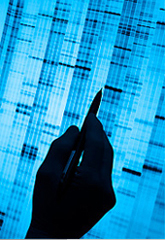
There’s a huge opportunity ahead for genome sequencing to impact human health, beginning with cancer and rare genetic diseases.
There is a documented history of conditions classified as “diseases of unknown origin”—in these cases, the biological mechanisms that led to the disease are simply unknown or have not yet been discovered. Yet as we learn more every day, certain diseases have clear links to underlying genetic mutations. As such, analyzing the genome sequence of a patient diagnosed with one of these diseases might help lead to a better understanding of the disease etiology and potential treatment strategies, particularly in the areas of cancer and rare genetic disorders.
Preventing cancer
While cancers have a range of causes and correlations, many have a set of genetic mutations that drive malignant growth. Recent advances have already introduced sequencing to the cancer category, as cancer patients are benefiting from genetic tests that reveal their personal risk for certain tumors (such as BRCA for breast cancer). Recently, evidence has suggested that certain genetic mutations could be responsible for the development of a wide range of tumor types (see the recent study in Nature, for example). These findings support the idea of using genomic analysis to predict an individual’s cancer risk, by comparing their genome with databases of confirmed genetic mutations linked to disease.
Treating Cancer
In addition, genomic sequencing and analysis may help better understand the genetics of the tumor itself, and can provide explanations for how tumors evolve over time. Tests are increasingly available today that can help predict a tumor’s response to a specific type of treatment. With a genomic-based approach to cancer care, researchers expect that treatment will evolve to be more tailored to an individual tumor’s mutations and, eventually, through drugs that can attack several targeted gene mutations at once. Already we’ve seen evidence of this in certain areas, such as breast cancer drugs intended for use only in patients who test positive for the HER2 gene.
Identifying Rare Diseases
Rare diseases are another area of significant opportunity for improved diagnosis and treatment through the use of genomics. Every year there are new cases of children with “unknown” diseases, many of which are likely related to a hereditary genetic disorder. These children and their families often spend years undergoing testing and experimental treatments for a wide range of diseases to attempt to properly diagnose and treat them, usually accompanied by a very high financial and emotional burden.
There is a hope that by offering whole genome sequencing to patients with a suspected rare genetic disease, mutations that might be causing the disease may be identified, and thus correct treatment can be employed much earlier to eliminate the burden of a long-term diagnostic and treatment odyssey.
Cancer and rare genetic diseases are just the start. There’s a huge opportunity ahead for genome sequencing to impact human health, and personalized medicine may be just on the horizon. In fact, we are focusing on just these areas with NextCODE, the newly launched company I’ve founded. The improvements brought about by the genomics industry, with the help of the technologies and services offered at NextCODE, will provide enormous value to patients, doctors, and the health care system as a whole.
